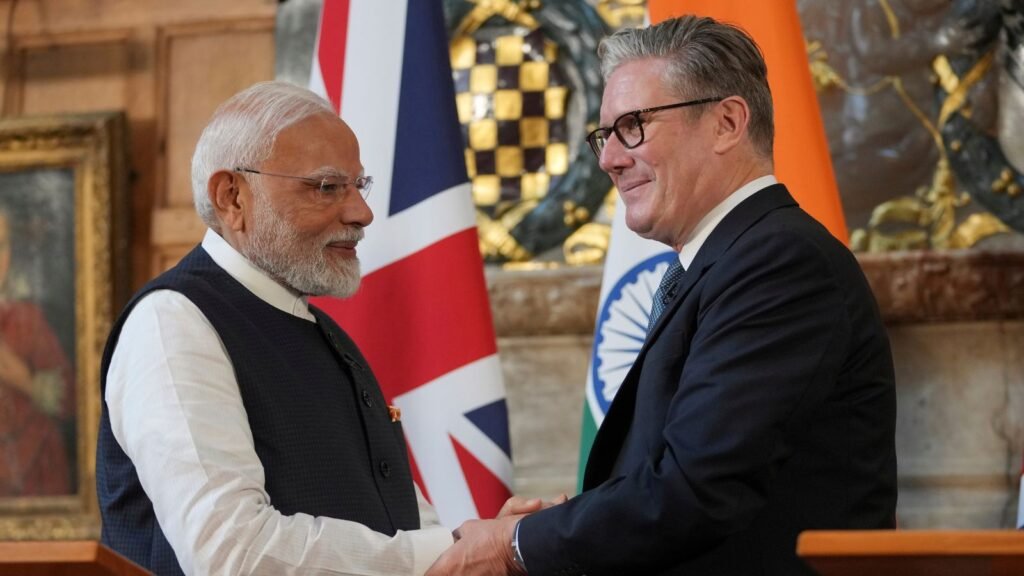India’s trade deal with the UK will provide a boost to domestic services companies, with the two governments agreeing that employees working temporarily for a period of up to three years in the other country will only have to pay social security contributions in their home countries. This will raise take-home salaries and reduce costs for Indian companies, and is expected to benefit around 75,000 Indian workers.
The reciprocal Double Contributions Convention (DCC) is in addition to the Comprehensive and Economic Trade Agreement (CETA) that covers nearly 100 per cent of trade value between India and the UK. The DCC ensures employees moving between the two countries and their employers will only have to pay social security contributions in one country at a time. For temporary workers, the DCC ensures that “fragmentation of their social security record” does not occur, the UK government said on Thursday.
According to Prime Minister Narendra Modi, the DCC will inject “new energy” into the Indian and UK services sectors, particularly in technology and finance. “It will promote ease of doing business, reduce cost of doing business, and increase the confidence of doing business. Additionally, UK’s economy would benefit from India’s skilled talent. These agreements will enhance investments and generate new employment opportunities in both countries. Moreover, as agreements reached between two democracies and two of the world’s major economies, they will lend support to global stability and global prosperity,” Modi said at the joint briefing with his counterpart, Keir Starmer, on Thursday.
A DCC does not cover access to social security benefits and does not change rules on access to benefits. The UK has agreements similar to the DCC with almost 50 countries. India, meanwhile, has such an understanding with 20 countries. According to British media reports, the exemption for India will cost the British government about £100 million.
As part of the trade deal, IT and IT-enabled services, financial and legal services, professional and educational services, and digital trade will get greater access to the UK market. “Indian professionals, including those deployed by companies to work in the UK across all services sectors, professionals deployed on contracts such as architects, engineers, chefs, yoga instructors and musicians, will benefit from simplified visa procedures and liberalised entry categories, making it easier for talent to work in the UK,” the Commerce Ministry said in a statement on Thursday.
Services trade is key for India as it enjoys a surplus, compared to a heavy deficit when it comes to merchandise trade. In 2024-25, while India had a total merchandise trade deficit of $287 billion with the rest of the world, it had a services trade surplus of $189 billion. Specifically, India’s services exports to the UK rose 16 per cent in 2024 to £14.7 billion, according to data from the Office of National Statistics, while services imports from the UK were flat at £10.1 billion.
The exemption on insurance payments to Indian employees temporarily working in the UK has been a source of friction in British politics for years. In 2022, the then Home Secretary, Suella Braverman, had expressed her reservations about the trade deal with India, warning that it could lead to greater immigration to the UK, adding that Indians accounted for the largest number of those who overstayed their visas.
Story continues below this ad
More recently, after the deal was announced in May, shadow justice secretary Robert Jenrick said the social security contributions exemption was a sign that Starmer put British workers “last”. “This trade deal means Indian workers here for less than three years will not pay national insurance in the UK. Starmer has hiked national insurance on Brits while giving an exemption to Indian migrants. British workers come last in Starmer’s Britain,” Jenrick had said on X on May 6.
However, the UK government said Thursday that the net impact of the DCC on the British economy was “significantly positive” and the cost of the DCC agreement “is likely to be a fraction of the overall deal’s economic benefit”. It said the DCC will not make it cheaper for UK firms to hire Indian workers and is not seen to have a long-term impact on net migration.


